 January 1980 cover | |
| Categories | Music magazine |
|---|---|
| Founded | 1978 |
| First issue | December 1978 |
| Final issue | 1979 |
| Country | USA |
| Based in | Austin, Texas |
| Language | English |
Sluggo! was an Austin, Texas fanzine covering the late 1970s punk rock/new wave music scene. [1]
 January 1980 cover | |
| Categories | Music magazine |
|---|---|
| Founded | 1978 |
| First issue | December 1978 |
| Final issue | 1979 |
| Country | USA |
| Based in | Austin, Texas |
| Language | English |
Sluggo! was an Austin, Texas fanzine covering the late 1970s punk rock/new wave music scene. [1]
Founded in 1978 by Nick West [2] [3] and E.A. Srere, [4] Sluggo! began as a tabloid-sized photocopied publication, and evolved into a quintessential DIY publication. The first issue appeared in December 1978. [5] With the donation of a Multilith 1250 offset press and an array of colored inks, Sluggo! acquired its distinctive multi-colored, multi-faceted appearance. Sluggo! look was also defined by its unique covers – hand-crafted on some issues, individually silk-screened on black velvet on the finale.
The early issues centered primarily on music with reviews of shows of both local and touring bands, and record reviews of both national and international acts such as Pere Ubu, PIL, Throbbing Gristle. In addition to music, Sluggo! columnists also held forth on subjects ranging from religion to science, international politics to local gossip.
In 1979, Sluggo! departed from the typical music fanzine with the introduction of its thematic issues. Topics were Violence, Unco, and culminated with its "Industrial Collapse" issue. The magazine also created the Instant Review, publishing critiques of local performances overnight with free distribution on the streets the very next day. The Sluggo! press was used not only for printing the fanzine but was also made available to local bands for printing band posters and record covers, and to other raconteurs for printing various handbills and broadsides. Sluggo! House became one of the centers of the exploding Austin scene and drew considerable local and national attention as a hotbed of musical and artistic action.
Sluggo! provided inspiration to other writers and entrepreneurs to found and publish their own fanzines including Xiphoid Process and Contempo Culture from Austin, and a myriad of others throughout Texas. Sluggo!'s topical format also served as a model to the staff at Search & Destroy Magazine from San Francisco to expand their horizons and begin the RE/Search magazine with issues devoted to a single topic.
Sluggo! was a primary ambassador of the 1970s Austin punk/new wave scene throughout Texas, the nation and overseas. Its evolution from a modest home grown fanzine to a distinctively quirky journal with ambitions of a wider cultural window mirrors the peculiar growth of the Austin punk music and artistic scene, and its future development into the behemoth it is today. It ceased publication in 1979. [6]

A fanzine is a non-professional and non-official publication produced by enthusiasts of a particular cultural phenomenon for the pleasure of others who share their interest. The term was coined in an October 1940 science fiction fanzine by Russ Chauvenet and first popularized within science fiction fandom, and from there the term was adopted by other communities.
Punk rock is a music genre that emerged in the mid-1970s. Rooted in 1960s garage rock, punk bands rejected the perceived excesses of mainstream 1970s rock music. They typically produced short, fast-paced songs with hard-edged melodies and singing styles, stripped-down instrumentation, and often shouted political, anti-establishment lyrics. Punk embraces a DIY ethic; many bands self-produce recordings and distribute them through independent record labels.

"Do it yourself" ("DIY") is the method of building, modifying, or repairing things by oneself without the direct aid of professionals or certified experts. Academic research has described DIY as behaviors where "individuals use raw and semi-raw materials and parts to produce, transform, or reconstruct material possessions, including those drawn from the natural environment ". DIY behavior can be triggered by various motivations previously categorized as marketplace motivations, and identity enhancement.
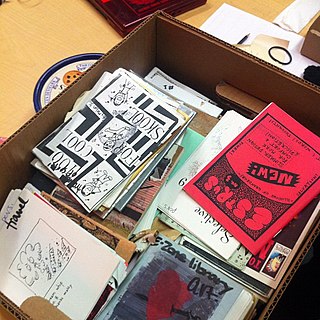
A zine is a small-circulation self-published work of original or appropriated texts and images, usually reproduced via a copy machine. Zines are the product of either a single person or of a very small group, and are popularly photocopied into physical prints for circulation. A fanzine is a non-professional and non-official publication produced by enthusiasts of a particular cultural phenomenon for the pleasure of others who share their interest. The term was coined in an October 1940 science fiction fanzine by Russ Chauvenet and popularized within science fiction fandom, entering the Oxford English Dictionary in 1949.

Sniffin' Glue and Other Rock 'N' Roll Habits..., widely known as simply Sniffin' Glue, was a monthly punk zine started by Mark Perry in July 1976 and released for about a year. The name is derived from a Ramones song "Now I Wanna Sniff Some Glue." Some of the zine's writers, such as Danny Baker, later became well-known journalists.
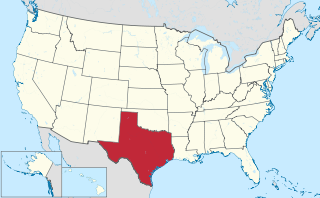
The U.S. state of Texas has long been a center for musical innovation and is the birthplace of many notable musicians. Texans have pioneered developments in Tejano and Conjunto music, Rock 'n Roll, Western swing, jazz, punk rock, country, hip-hop, electronic music, gothic industrial music, religious music, mariachi, psychedelic rock, zydeco and the blues.
Queercore is a cultural/social movement that began in the mid-1980s as an offshoot of the punk subculture and a music genre that comes from punk rock. It is distinguished by its discontent with society in general, and specifically society's disapproval of the LGBT community. Queercore expresses itself in a DIY style through magazines, music, writing and film.

A punk zine is a zine related to the punk subculture and hardcore punk music genre. Often primitively or casually produced, they feature punk literature, such as social commentary, punk poetry, news, gossip, music reviews and articles about punk rock bands or regional punk scenes.
Maximumrocknroll, often written as Maximum Rocknroll and usually abbreviated as MRR, is a not-for-profit monthly online zine of punk subculture and radio show of punk music. Based in San Francisco, MRR focuses on punk rock and hardcore music, and primarily features artist interviews and music reviews. Op/ed columns and news roundups are regular features as well, including submissions from international contributors. By 1990, it "had become the de facto bible of the scene". MRR is considered to be one of the most important zines in punk, not only because of its wide-ranging coverage, but because it has been a consistent and influential presence in the ever-changing punk community for over three decades. From 1992 to 2011, it published a guide called Book Your Own Fuckin' Life.
Profane Existence is a Minneapolis-based anarcho-punk collective. Established in 1989, the collective publishes a nationally known zine, as well as releasing and distributing anarcho-punk, crust, and grindcore music, and printing and publishing pamphlets and literature. Stacy Thompson describes the collective as "the largest, longest-lasting, and most influential collective in Anarcho-Punk so far." The collective folded in 1998, although its distribution arm, then called Blackened Distribution, continued operating. It restarted in 2000. "Making punk a threat again" is the group's slogan.
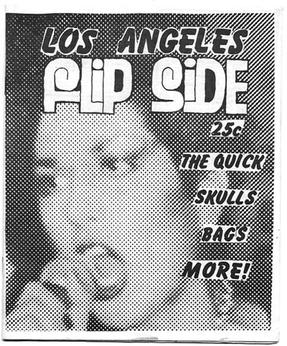
Flipside, known as Los Angeles Flipside Fanzine, was a punk zine published in Whittier and Pasadena, California, from 1977 to 2002. The magazine was associated with its own record label, Flipside Records, releasing vinyl records and compact discs beginning in 1978.
RE/Search Publications is an American magazine and book publisher, based in San Francisco, founded by its editor V. Vale in 1980. In several issues, Andrea Juno was also credited as an editor. It was the successor to Vale's earlier punk rock fanzine Search & Destroy (1977–1979), which was started with small donations, provided to Vale by Allen Ginsberg and Lawrence Ferlinghetti. RE/Search has published tabloid-sized magazines and books.
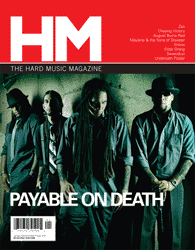
HM Magazine is a monthly, digital and print on demand publication focusing on hard music and alternative culture of interest to Christians. It is headquartered in Houston, Texas. The magazine states that its goal is to "honestly and accurately cover the current state of hard music and alternative culture from a faith-based perspective."
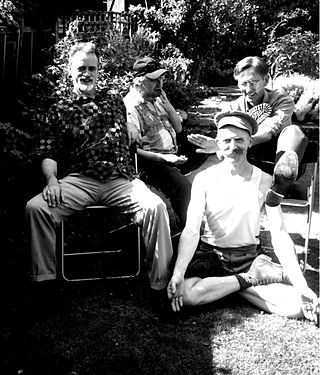
Punk literature is literature related to the punk subculture. The attitude and ideologies of punk rock gave rise to distinctive characteristics in the writing it manifested. It has influenced the transgressional fiction literary genre, the cyberpunk genre and their derivatives.
German punk includes a body of music and a subculture that have evolved since punk rock became popular in Germany in the 1970s. Within the subculture of punk in Germany, a style of music called Deutschpunk was developed; this style of music has developed distinctly from hardcore punk, and includes lyrics in German as well as a fast tempo. In the punk scene in Germany, some bands play music in the Deutschpunk style, while other German punk bands pursue various other styles of punk music.
Since the mid-1970s, California has had thriving regional punk rock movements. It primarily consists of bands from the Los Angeles, Orange County, Ventura County, San Diego, San Fernando Valley, San Francisco, Fresno, Bakersfield, Alameda County, Sacramento, Lake Tahoe, Oakland and Berkeley areas.
Raul's was a live music nightclub at 2610 Guadalupe Street in Austin, Texas in the late 1970s and early 1980s, which started off as a Chicano music venue, but then specialized in punk rock music. The location is near the University of Texas campus.
Inner Sanctum Records was a record shop in Austin, Texas. The retailer was variously cited as the first indie record shop in Texas and, at the time of its closure, the oldest in Central Texas.

Psychotronic Video was an American film magazine founded by publisher/editor Michael J. Weldon in 1980 in New York City, covering what he dubbed "psychotronic movies", which he defined as "the ones traditionally ignored or ridiculed by mainstream critics at the time of their release: horror, exploitation, action, science fiction, and movies that used to play in drive-ins or inner city grindhouses." It was published through 2006. Most of the magazine's hundreds of reviews were written by Weldon himself. Other contributors provided career histories/interviews with cult filmmakers and actors such as Radley Metzger, Larry Cohen, Jack Hill, William Rotsler, David Carradine, Sid Haig, Karen Black, and Timothy Carey. Regular features included "Record Reviews" by Art Black, "Spare Parts" by Dale Ashmun, and "Never To Be Forgotten", an obituary column.
Riot grrrl is an underground feminist punk movement that began during the early 1990s within the United States in Olympia, Washington and the greater Pacific Northwest and has expanded to at least 26 other countries. Riot grrrl is a subcultural movement that combines feminism, punk music, and politics. It is often associated with third-wave feminism, which is sometimes seen as having grown out of the riot grrrl movement and has recently been seen in fourth-wave feminist punk music that rose in the 2010s. The genre has also been described as coming out of indie rock, with the punk scene serving as an inspiration for a movement in which women could express anger, rage, and frustration, emotions considered socially acceptable for male songwriters but less common for women.
Call me biased but Sluggo! was the best zine I ever saw -- in love with the Huns, trashing Standing Waves, and rejecting nearly everything else. In its four- or five-issue lifespan in Austin, Sluggo! forever changed the way I viewed music as well as writing. Now that's the power of the underground press.
Nick West was the driving force behind the Austin punk zine Sluggo. His current gig: senior interface architect and advanced technology director at Austin's MonkeyMedia.
E.A. Srere was writing for Sluggo! and playing in the Chickadiesels ... that's a snapshot of 1979.